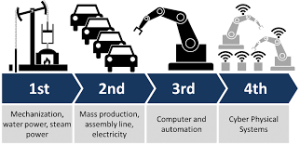The Fourth Industrial Revolution: Transforming the Future of Industry and Society
The Fourth Industrial Revolution (4IR) marks a new era in human development, where advanced technologies are reshaping industries, economies, and societies at an unprecedented pace. Coined by Klaus Schwab, Founder of the World Economic Forum, the term refers to the fusion of physical, digital, and biological systems that is revolutionizing the way we live, work, and interact.
The Fourth Industrial Revolution: What is it?
The digital revolution of the 20th century is expanded upon by the Fourth Industrial Revolution, which advances innovation with intelligent technologies like
AI, or artificial intelligence
Learning Machines (ML)
The Internet of Things
Blockchain Technology
5G Internet Access
Automation and Robotics
Virtual reality (VR) and augmented reality (AR)
Nanotechnology and Biotechnology
These innovations are blurring the lines between the physical and digital worlds, creating intelligent, interconnected systems that can analyze, learn, and make decisions faster than ever before.
Key Features of the Fourth Industrial Revolution
-
Automation & AI Integration – Replacing repetitive tasks with intelligent machines.
-
Data-Driven Decisions – Leveraging big data analytics for real-time insights.
-
Personalization – Offering customized products and services through predictive technology.
-
Sustainability – Using tech to create eco-friendly solutions and reduce waste.
Global Connectivity – Linking devices, industries, and people across borders.
Effects on Sectors
The Fourth Industrial Revolution is reshaping sectors such as:
-
Manufacturing – Smart factories powered by IoT and robotics.
-
Healthcare – AI-assisted diagnostics and telemedicine.
-
Finance – Blockchain-enabled secure transactions and digital banking.
-
Education – E-learning platforms with adaptive AI tools.
-
Agriculture – Precision farming using sensors and drones.
Benefits of the Fourth Industrial Revolution
-
Increased Efficiency & Productivity
-
Cost Reduction through automation
-
Enhanced Customer Experiences
-
Faster Innovation Cycles
-
Global Collaboration Opportunities
Challenges of the Fourth Industrial Revolution
While promising, 4IR comes with critical challenges:
-
Job Displacement due to automation
-
Cybersecurity Threats from increased connectivity
-
Digital Divide between tech-advanced and developing nations
-
Ethical Concerns in AI and Genetic Engineering
Preparing for the Fourth Industrial Revolution
To thrive in the 4IR era, individuals and businesses must:
-
Embrace Lifelong Learning and digital skills.
-
Adopt Emerging Technologies early.
-
Promote Ethical Tech Use and responsible innovation.
-
Invest in Cybersecurity to protect data and systems.
